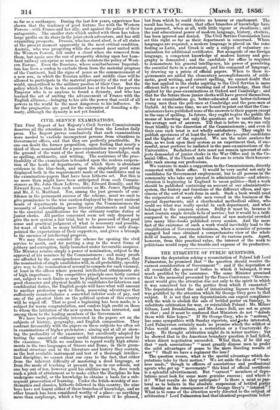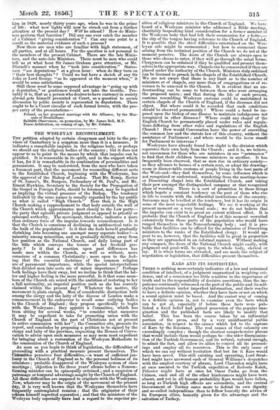THE ETIQUETTE OF PUBLIC QUESTIONS.
BEFORE the deputation asking a resuscitation of Poland left Lord Palmerston, he promised that " the question should receive the earnest consideration of Government : and if the deputation at all resembled the genus of bodies to which it belonged, it was much gratified by the assurance. The same Minister promised that to the memorial presented by the Peace Conference " Govern- ment would give the attention due not only to the spirit in which it was conceived but to the parties from which it emanated." The deputation about the sale of intoxicating liquors on Sunday was gratified by the attention which Sir George Grey gave to that subject. It is not that any deputationists can expect compliance with the wish to abolish the sale of bottled porter on Sunday, to substitute arbitration for war, or reestablish Poland : Mr. Milner Gibson, Lord Breadalbane, and Mr. James Bell, are not so green as that ; and it must be confessed that Ministers do not "delude them with false hopes." If Sir George Grey, who is " serious " has some sympathies with Sunday rigorists, andolooks interested, Lord Palmerston certainly made no promise which the wildest of Poles would construe into a restoration or a Czartoryski dy- nasty. He thought arbitration might do ih minor matters ; but he showed that in the American boundary question it had failed, where direct negotiation succeeded. What then, if he did say that " such associations" " must greatly dispose men to prefer the solid advantages of peace to the more dazzling results of war " ? Shall we have a regiment the less ? The question recurs, what is the special advantage which de- putations take by their motion? We set aside the idea of "busi- ness made," though to officers of associations and professional agents who get up " movements" this kind of official certificate is a splendid advertisement. But " earnest " members of depu- tations must look for some more genuine success ; and where is it? What results do they anticipate ? Is there a saint so pas- toral as to believe in the absolute suspension of bottled porter on Sunday as the consequence of Sir George Grey's "interest" ? What is to come of the attention newly, directed to the subject of arbitration ? Lord Palmerston had that identical proposition before him in 1828, nearly thirty years ago, when he was in the prime of life : what new lights will now be struck out from a further attention at the present day? Will he attend ? How do Minis- ters perform that function? Did any one ever catch the member of a Cabinet " giving consideration' ? Can any one point to a result as the material evidence of such a process ?
Now there are men who are familiar with high statesmen, of all parties, and at all hours. For the question is not personal to the members of the present Cabinet. There are the late Minis- ters, and the ante-late Ministers. There must be men who could tell us at what hour Sir James Graham gave attention, or Mr. Disraeli's manner when he "took into consideration." States- men " see deputations " at a given hour : when do they turn on "their best thoughts " ? Could we but have a sketch of any Sir John or Lord George " as he appeared at the moment when," it would be some satisfaction.
Still there must be some supposed advantage in " going up with a deputation," or gentlemen would not take the trouble. Pro- bably it is, that as a person who desires to have currency in sooiety abroad gets himself presented at Court, so a question to secure discussion by polite society is represented in deputation. There ought to be a Court circular of such formal levees, with the pro- per entry of the presentations—
Poland, on her proposed marriage with the Alliance, by the Mar- quis of Breadalbane. Sabbath Observance, on promotion, by Mr. James Bell, M.P. Peace-Arbitration, on coming of age, by Mr. Cobden.



























 Previous page
Previous page